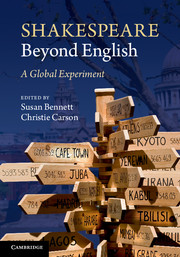Book contents
- Frontmatter
- Contents
- List of Illustrations
- List of colour plates
- Notes on contributors
- Foreword
- Acknowledgements
- Introduction
- The Globe to Globe Festival: An Introduction
- Performance Calendar
- Week One
- Chapter One U Venas no Adonisi
- Chapter Two Festival showcasing and cultural regeneration
- Chapter Three ‘What's mine is yours, and what is yours is mine’
- Chapter Four ‘The girl defies’
- Chapter Five Pericles and the Globe
- Chapter Six Technicolour Twelfth Night
- Week Two
- Week Three
- Week Four
- Week Five
- Week Six
- Afterwords
- Index
- Plate section
- References
Chapter Three - ‘What's mine is yours, and what is yours is mine’
Measure for Measure, Vakhtangov Theatre, Moscow
Published online by Cambridge University Press: 05 June 2014
- Frontmatter
- Contents
- List of Illustrations
- List of colour plates
- Notes on contributors
- Foreword
- Acknowledgements
- Introduction
- The Globe to Globe Festival: An Introduction
- Performance Calendar
- Week One
- Chapter One U Venas no Adonisi
- Chapter Two Festival showcasing and cultural regeneration
- Chapter Three ‘What's mine is yours, and what is yours is mine’
- Chapter Four ‘The girl defies’
- Chapter Five Pericles and the Globe
- Chapter Six Technicolour Twelfth Night
- Week Two
- Week Three
- Week Four
- Week Five
- Week Six
- Afterwords
- Index
- Plate section
- References
Summary
The Vakhtangov Theatre, established in 1922, is named after Stanislavski's protégé, Evgeny Vakhtangov. The theatre perpetuates the distinctive dramatic technique of its founder, embodied in Vakhtangov's Imaginative or Fantastic Realism (fantasticheskii realism), which contrasts fundamentally with Stanislavski's own naturalistic dramaturgy. With its ironic style of acting and emphasis on elements of the grotesque, Vakhtangov's experimental physicality and psychological intensity continue to inform the company's artistry.
For this Russian Measure for Measure, Vakhtangov's ‘grotesque’ and ‘ironic’ formulations served to highlight the visual and aural intensity of the drama. Since the play is not particularly well known in Russia, its director, Yuri Butusov, felt free to adapt it to suit the company's stylistic needs. Butusov's most radical alteration was to double Duke Vicentio (sic) with Angelo. The impressively tall Sergy Epishev, who towered menacingly over his fellow actors, played both duke and deputy. As the duke, Epishev presented a self-controlled aristocrat whose effeteness accounted for Vienna's moral decline. As Angelo, Epishev became a gangling bureaucrat, uncomfortable in his ill-fitting suit and straitjacketed in his moral outwardness. It was, however, in disguise as Friar Lodowick that Epishev's physicality offered the most striking visual analogue. In black-hooded habit, Epishev appeared more Mephistophelean opportunist than ducal manipulator.
- Type
- Chapter
- Information
- Shakespeare beyond EnglishA Global Experiment, pp. 48 - 52Publisher: Cambridge University PressPrint publication year: 2013



